Development for Success in Business
VerifiedAdded on 2023/06/13
|7
|1003
|211
AI Summary
This article analyzes the Honey and Mumford learning theory and Dolnicar's classification of students to identify the author's learning style and weaknesses. Strategies to address these weaknesses are also discussed.
Contribute Materials
Your contribution can guide someone’s learning journey. Share your
documents today.
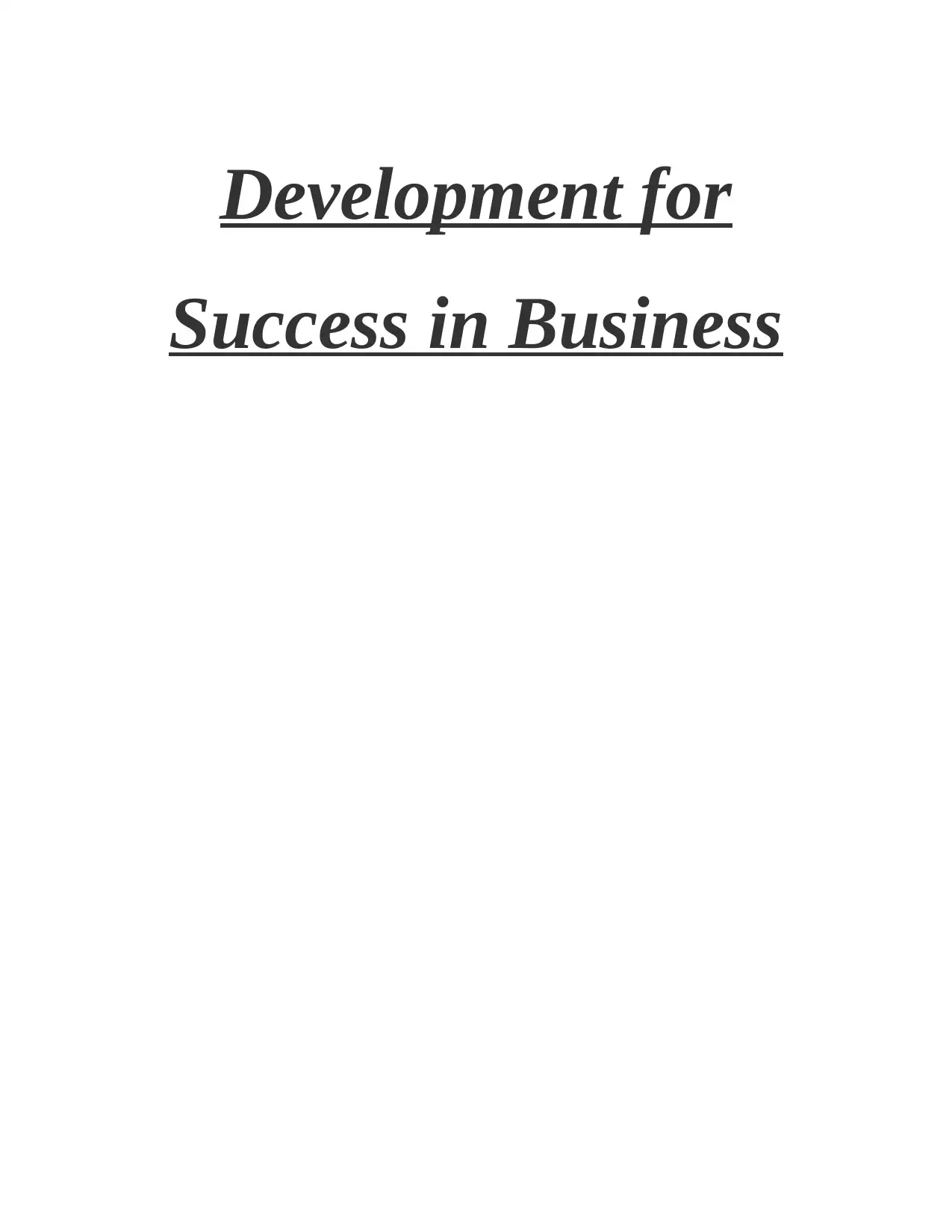
Development for
Success in Business
Success in Business
Secure Best Marks with AI Grader
Need help grading? Try our AI Grader for instant feedback on your assignments.
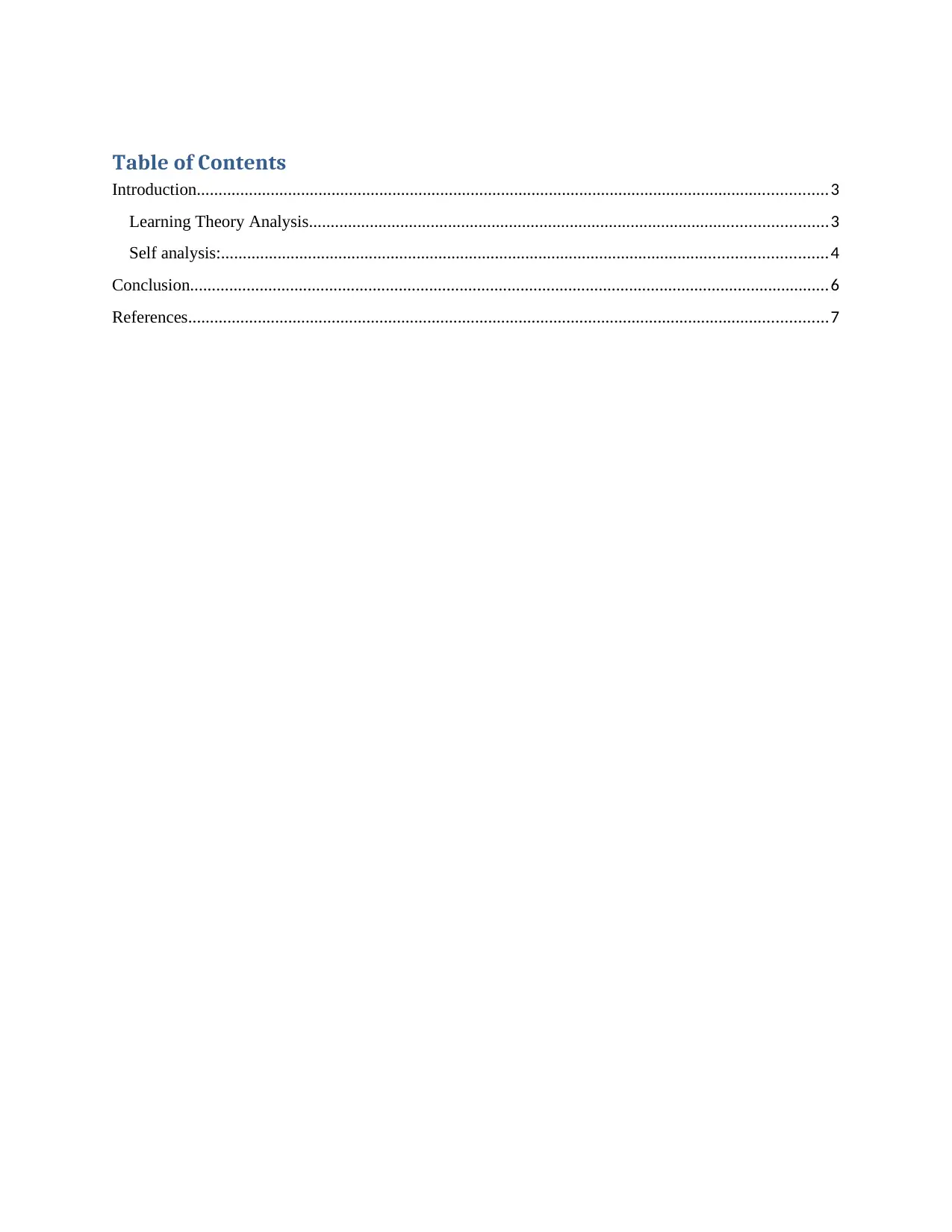
Table of Contents
Introduction.................................................................................................................................................3
Learning Theory Analysis.......................................................................................................................3
Self analysis:...........................................................................................................................................4
Conclusion...................................................................................................................................................6
References...................................................................................................................................................7
Introduction.................................................................................................................................................3
Learning Theory Analysis.......................................................................................................................3
Self analysis:...........................................................................................................................................4
Conclusion...................................................................................................................................................6
References...................................................................................................................................................7
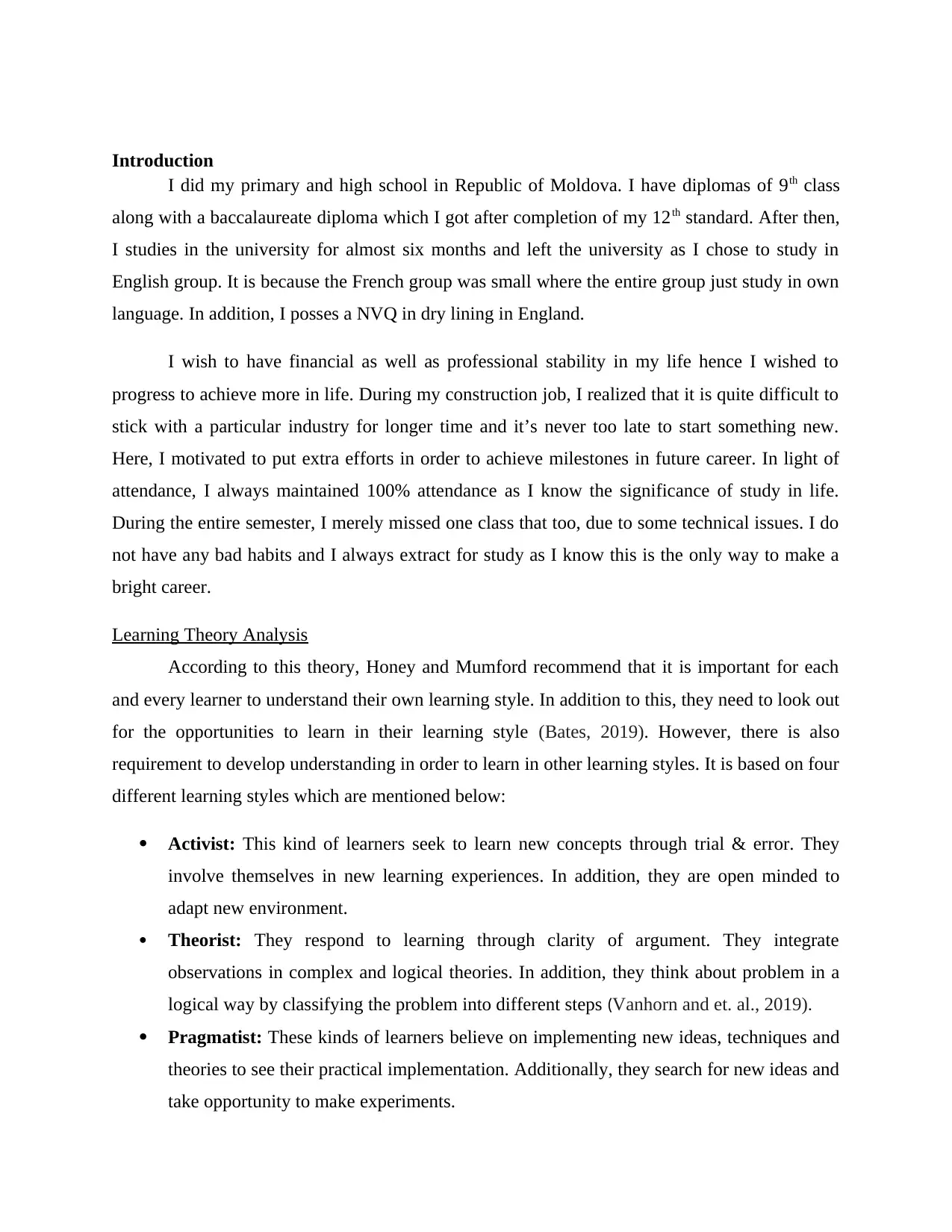
Introduction
I did my primary and high school in Republic of Moldova. I have diplomas of 9th class
along with a baccalaureate diploma which I got after completion of my 12th standard. After then,
I studies in the university for almost six months and left the university as I chose to study in
English group. It is because the French group was small where the entire group just study in own
language. In addition, I posses a NVQ in dry lining in England.
I wish to have financial as well as professional stability in my life hence I wished to
progress to achieve more in life. During my construction job, I realized that it is quite difficult to
stick with a particular industry for longer time and it’s never too late to start something new.
Here, I motivated to put extra efforts in order to achieve milestones in future career. In light of
attendance, I always maintained 100% attendance as I know the significance of study in life.
During the entire semester, I merely missed one class that too, due to some technical issues. I do
not have any bad habits and I always extract for study as I know this is the only way to make a
bright career.
Learning Theory Analysis
According to this theory, Honey and Mumford recommend that it is important for each
and every learner to understand their own learning style. In addition to this, they need to look out
for the opportunities to learn in their learning style (Bates, 2019). However, there is also
requirement to develop understanding in order to learn in other learning styles. It is based on four
different learning styles which are mentioned below:
Activist: This kind of learners seek to learn new concepts through trial & error. They
involve themselves in new learning experiences. In addition, they are open minded to
adapt new environment.
Theorist: They respond to learning through clarity of argument. They integrate
observations in complex and logical theories. In addition, they think about problem in a
logical way by classifying the problem into different steps (Vanhorn and et. al., 2019).
Pragmatist: These kinds of learners believe on implementing new ideas, techniques and
theories to see their practical implementation. Additionally, they search for new ideas and
take opportunity to make experiments.
I did my primary and high school in Republic of Moldova. I have diplomas of 9th class
along with a baccalaureate diploma which I got after completion of my 12th standard. After then,
I studies in the university for almost six months and left the university as I chose to study in
English group. It is because the French group was small where the entire group just study in own
language. In addition, I posses a NVQ in dry lining in England.
I wish to have financial as well as professional stability in my life hence I wished to
progress to achieve more in life. During my construction job, I realized that it is quite difficult to
stick with a particular industry for longer time and it’s never too late to start something new.
Here, I motivated to put extra efforts in order to achieve milestones in future career. In light of
attendance, I always maintained 100% attendance as I know the significance of study in life.
During the entire semester, I merely missed one class that too, due to some technical issues. I do
not have any bad habits and I always extract for study as I know this is the only way to make a
bright career.
Learning Theory Analysis
According to this theory, Honey and Mumford recommend that it is important for each
and every learner to understand their own learning style. In addition to this, they need to look out
for the opportunities to learn in their learning style (Bates, 2019). However, there is also
requirement to develop understanding in order to learn in other learning styles. It is based on four
different learning styles which are mentioned below:
Activist: This kind of learners seek to learn new concepts through trial & error. They
involve themselves in new learning experiences. In addition, they are open minded to
adapt new environment.
Theorist: They respond to learning through clarity of argument. They integrate
observations in complex and logical theories. In addition, they think about problem in a
logical way by classifying the problem into different steps (Vanhorn and et. al., 2019).
Pragmatist: These kinds of learners believe on implementing new ideas, techniques and
theories to see their practical implementation. Additionally, they search for new ideas and
take opportunity to make experiments.
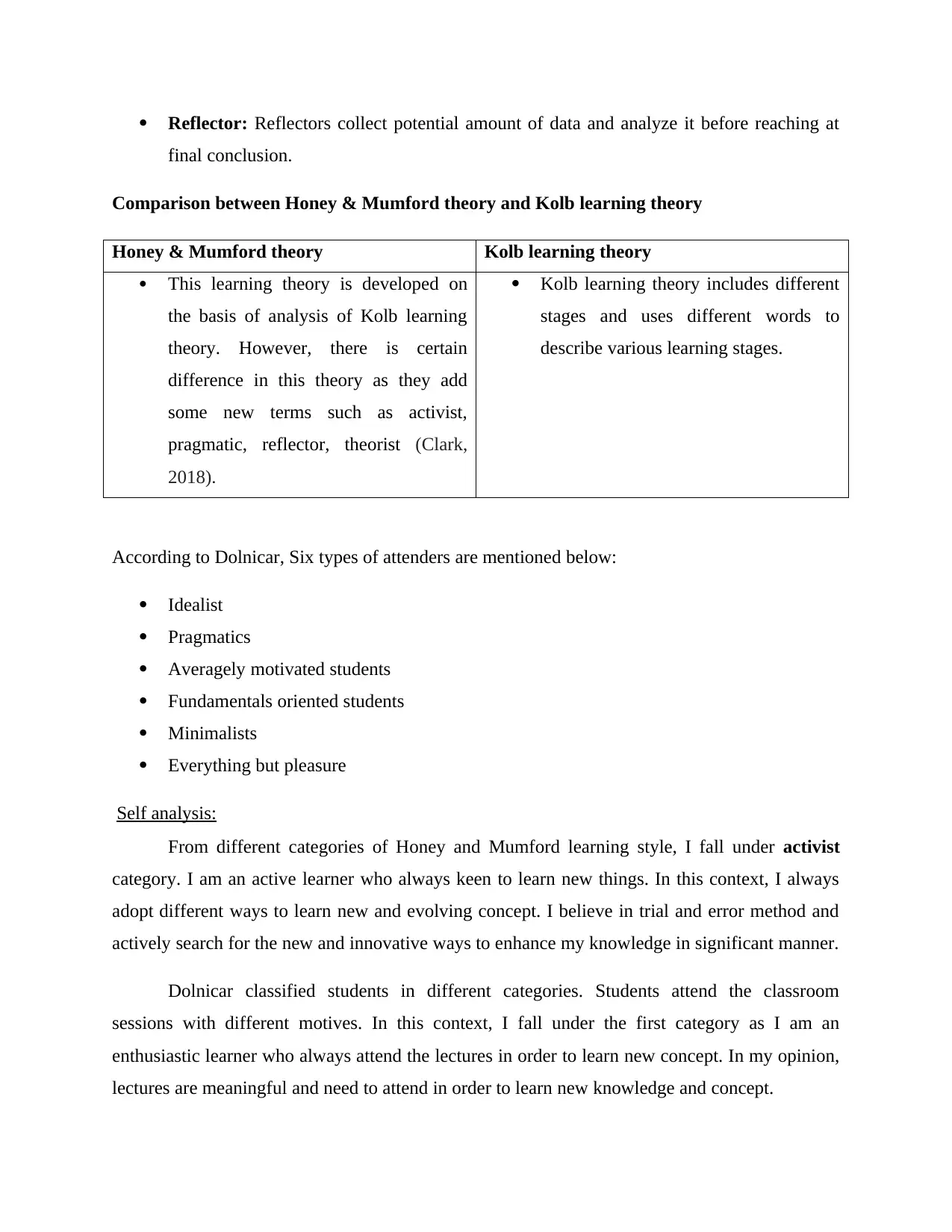
Reflector: Reflectors collect potential amount of data and analyze it before reaching at
final conclusion.
Comparison between Honey & Mumford theory and Kolb learning theory
Honey & Mumford theory Kolb learning theory
This learning theory is developed on
the basis of analysis of Kolb learning
theory. However, there is certain
difference in this theory as they add
some new terms such as activist,
pragmatic, reflector, theorist (Clark,
2018).
Kolb learning theory includes different
stages and uses different words to
describe various learning stages.
According to Dolnicar, Six types of attenders are mentioned below:
Idealist
Pragmatics
Averagely motivated students
Fundamentals oriented students
Minimalists
Everything but pleasure
Self analysis:
From different categories of Honey and Mumford learning style, I fall under activist
category. I am an active learner who always keen to learn new things. In this context, I always
adopt different ways to learn new and evolving concept. I believe in trial and error method and
actively search for the new and innovative ways to enhance my knowledge in significant manner.
Dolnicar classified students in different categories. Students attend the classroom
sessions with different motives. In this context, I fall under the first category as I am an
enthusiastic learner who always attend the lectures in order to learn new concept. In my opinion,
lectures are meaningful and need to attend in order to learn new knowledge and concept.
final conclusion.
Comparison between Honey & Mumford theory and Kolb learning theory
Honey & Mumford theory Kolb learning theory
This learning theory is developed on
the basis of analysis of Kolb learning
theory. However, there is certain
difference in this theory as they add
some new terms such as activist,
pragmatic, reflector, theorist (Clark,
2018).
Kolb learning theory includes different
stages and uses different words to
describe various learning stages.
According to Dolnicar, Six types of attenders are mentioned below:
Idealist
Pragmatics
Averagely motivated students
Fundamentals oriented students
Minimalists
Everything but pleasure
Self analysis:
From different categories of Honey and Mumford learning style, I fall under activist
category. I am an active learner who always keen to learn new things. In this context, I always
adopt different ways to learn new and evolving concept. I believe in trial and error method and
actively search for the new and innovative ways to enhance my knowledge in significant manner.
Dolnicar classified students in different categories. Students attend the classroom
sessions with different motives. In this context, I fall under the first category as I am an
enthusiastic learner who always attend the lectures in order to learn new concept. In my opinion,
lectures are meaningful and need to attend in order to learn new knowledge and concept.
Secure Best Marks with AI Grader
Need help grading? Try our AI Grader for instant feedback on your assignments.

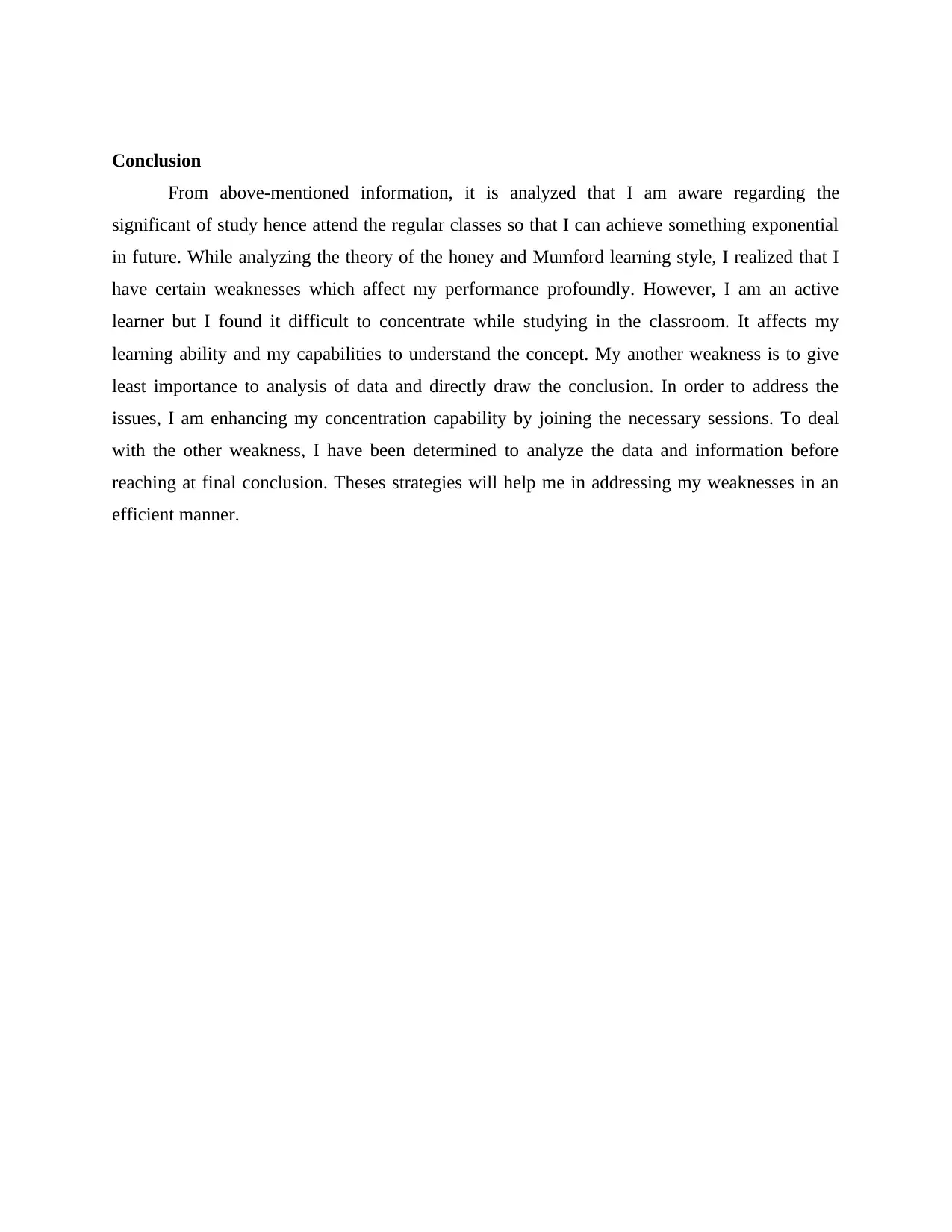
Conclusion
From above-mentioned information, it is analyzed that I am aware regarding the
significant of study hence attend the regular classes so that I can achieve something exponential
in future. While analyzing the theory of the honey and Mumford learning style, I realized that I
have certain weaknesses which affect my performance profoundly. However, I am an active
learner but I found it difficult to concentrate while studying in the classroom. It affects my
learning ability and my capabilities to understand the concept. My another weakness is to give
least importance to analysis of data and directly draw the conclusion. In order to address the
issues, I am enhancing my concentration capability by joining the necessary sessions. To deal
with the other weakness, I have been determined to analyze the data and information before
reaching at final conclusion. Theses strategies will help me in addressing my weaknesses in an
efficient manner.
From above-mentioned information, it is analyzed that I am aware regarding the
significant of study hence attend the regular classes so that I can achieve something exponential
in future. While analyzing the theory of the honey and Mumford learning style, I realized that I
have certain weaknesses which affect my performance profoundly. However, I am an active
learner but I found it difficult to concentrate while studying in the classroom. It affects my
learning ability and my capabilities to understand the concept. My another weakness is to give
least importance to analysis of data and directly draw the conclusion. In order to address the
issues, I am enhancing my concentration capability by joining the necessary sessions. To deal
with the other weakness, I have been determined to analyze the data and information before
reaching at final conclusion. Theses strategies will help me in addressing my weaknesses in an
efficient manner.
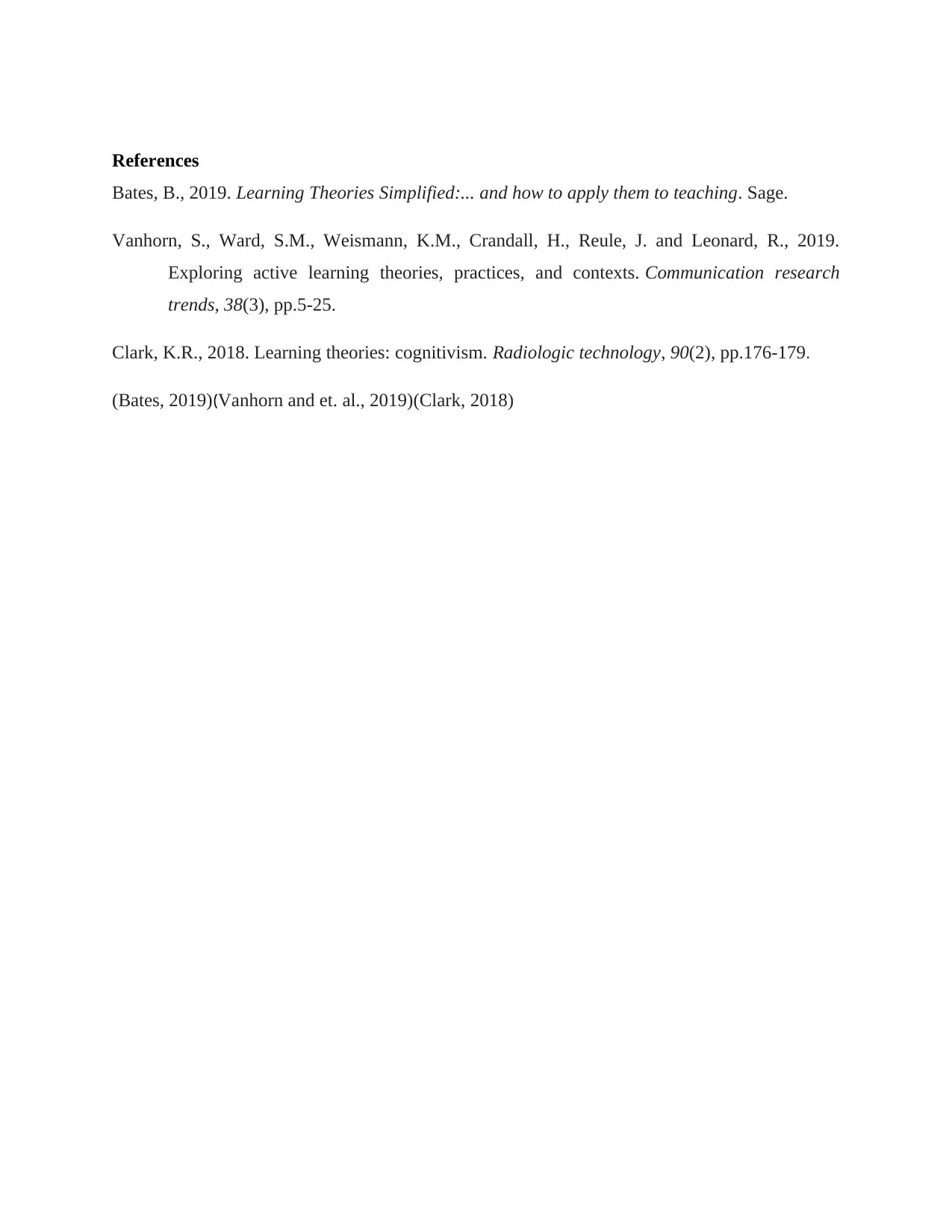
References
Bates, B., 2019. Learning Theories Simplified:... and how to apply them to teaching. Sage.
Vanhorn, S., Ward, S.M., Weismann, K.M., Crandall, H., Reule, J. and Leonard, R., 2019.
Exploring active learning theories, practices, and contexts. Communication research
trends, 38(3), pp.5-25.
Clark, K.R., 2018. Learning theories: cognitivism. Radiologic technology, 90(2), pp.176-179.
(Bates, 2019)(Vanhorn and et. al., 2019)(Clark, 2018)
Bates, B., 2019. Learning Theories Simplified:... and how to apply them to teaching. Sage.
Vanhorn, S., Ward, S.M., Weismann, K.M., Crandall, H., Reule, J. and Leonard, R., 2019.
Exploring active learning theories, practices, and contexts. Communication research
trends, 38(3), pp.5-25.
Clark, K.R., 2018. Learning theories: cognitivism. Radiologic technology, 90(2), pp.176-179.
(Bates, 2019)(Vanhorn and et. al., 2019)(Clark, 2018)
1 out of 7
Related Documents
Your All-in-One AI-Powered Toolkit for Academic Success.
+13062052269
info@desklib.com
Available 24*7 on WhatsApp / Email
![[object Object]](/_next/static/media/star-bottom.7253800d.svg)
Unlock your academic potential
© 2024 | Zucol Services PVT LTD | All rights reserved.





